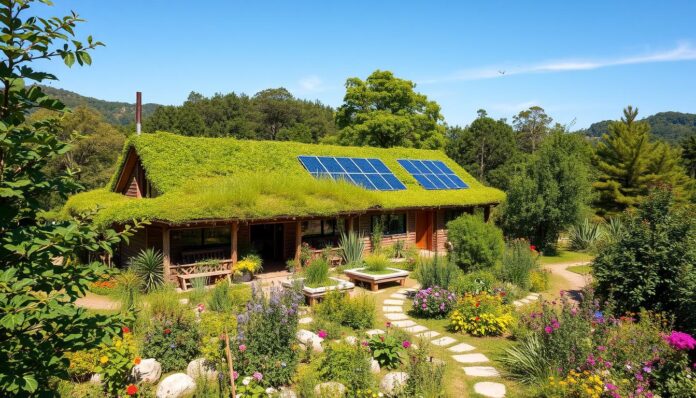Imagine a vacation that relaxes you and helps the environment and local community. This is what permaculture eco lodging offers. It’s a way to live off the land like nature does. Guests get to stay in eco-friendly places and join in on green activities.
More people are choosing eco-friendly stays. They want to leave a small footprint and enjoy nature. Permaculture lodging fits the bill with its focus on nature, eco-tourism, and farming.
Key Takeaways
- Permaculture eco lodging offers a unique experience for guests, providing a chance to stay in sustainable accommodation and participate in green living retreat activities.
- Permaculture eco lodging is a design philosophy that seeks to create sustainable and self-sufficient agricultural ecosystems by closely mimicking natural processes.
- Permaculture eco lodging provides an immersive experience in nature, with a focus on ecotherapy, ecotourism, and sustainable farming practices.
- Many permaculture eco lodges offer customized itineraries for guests, including meditation platforms, yoga shalas, and food forests.
- Permaculture eco lodging is becoming increasingly popular, with many travelers seeking out sustainable accommodation options that minimize their environmental footprint.
- Permaculture eco lodging promotes restorative healing for the environment and local community, making it an attractive option for those looking for a green living retreat.
Understanding Permaculture and Its Principles
Permaculture is a way to design sustainable environments. It follows three main ethics: care for the earth, care for people, and fair share of resources. These ethics help create systems that meet human needs and improve nature.
Definition of Permaculture
The term “permaculture” was created in the 1970s. It combines “permanent agriculture” and “permanent culture.” It aims to design systems that work like nature, boosting biodiversity and making farming more resilient.
The Ethics of Permaculture
The core ethics of permaculture are:
- care for the earth
- care for people
- fair share of resources
These ethics are key to making sustainable places like eco-friendly hotels and organic farm stays. They support regenerative tourism.
Permaculture Design Principles
Permaculture design principles include catching and storing energy, getting a yield, producing no waste, and valuing diversity. These principles lead to sustainable practices like collecting rainwater and reducing waste. They also encourage biodiversity.
By using these principles, eco-friendly hotels and organic farm stays can create environments that help the environment and local communities.
The Importance of Eco-Lodging in Sustainable Travel
Eco-lodging is key in sustainable travel. It lets travelers enjoy ecological lodging while keeping the environment clean. By picking earth-friendly accommodation, they help save natural resources and support local people.
Choosing sustainable accommodation has many benefits. It uses less energy, saves water, and cuts down on waste. For example, using rainwater can save 30-50% of water, based on how much rain falls in the area. Also, green building materials can lower heating and cooling costs by up to 75% compared to regular materials.
More people are now looking for sustainable accommodation. A big 70% of travelers are ready to pay more for places that are good for the planet. This shows a big change in what people want. As eco-tourism grows, the travel world needs to offer more ecological lodging choices.
Supporting earth-friendly accommodation helps make the tourism world greener. Eco-lodging offers many benefits, like:
- Less harm to the environment
- Helping local communities
- Protecting natural resources
- Special and deep travel experiences
As more people want sustainable accommodation, the travel industry must focus on ecological lodging. This way, travelers can have unique experiences and help the planet at the same time.
Essential Elements of Permaculture Eco-Lodging
Permaculture eco-lodging is a new way to travel that’s good for the planet. It aims to lessen harm to the environment while offering special experiences. It uses green building materials, smart water use, and clean energy.
This makes eco-lodges a great choice for those who care about the earth. They help reduce harm to nature, attracting more eco-friendly travelers.
In a green living retreat, green building is key. Materials like reclaimed wood, bamboo, and special concrete are used. Organic farm stays also follow permaculture, using compost and recycling. This cuts down waste and makes guests feel part of something special.
Sustainable Building Materials
Here are some green building materials found in eco-lodges:
- Reclaimed wood
- Bamboo
- Low-carbon concrete
- Recycled materials
Water Management Strategies
Good water use is vital in eco-lodges. They use:
- Rainwater harvesting
- Gray water recycling
- Efficient irrigation systems
Energy Efficiency Practices
Eco-lodges also focus on saving energy. They use:
| Practice | Benefits |
|---|---|
| Solar energy | Renewable energy source, reduced energy costs |
| Wind energy | Renewable energy source, reduced reliance on fossil fuels |
| Energy-efficient appliances | Reduced energy consumption, lower energy costs |
By using these green practices, eco-lodges offer a unique, eco-friendly stay. They also help protect the environment and support local areas.
The Role of Local Communities in Eco-Lodging
Local communities are key to eco-lodging success, especially in regenerative tourism. Working with local workers, celebrating local culture, and involving guests in activities make eco-lodges special. They also help the lodge and local economy grow.
This way of running eco-lodges supports local jobs and keeps cultural and environmental heritage alive. It makes guests’ stays more real and meaningful.
Collaborating with Local Workers
Working with local workers is crucial for eco-lodges. It keeps tourism money in the community, helping local families and boosting the area’s economy.
Promoting Local Culture and Heritage
Showing off local culture and heritage is vital. Eco-lodges can do this through cultural events, tours, and using local art and crafts. This enriches the lodge and guests’ experiences.
Engaging Guests in Community Activities
Getting guests involved in local activities is powerful. It helps guests understand different cultures and supports local projects. This makes tourism more meaningful and supports ecological values.
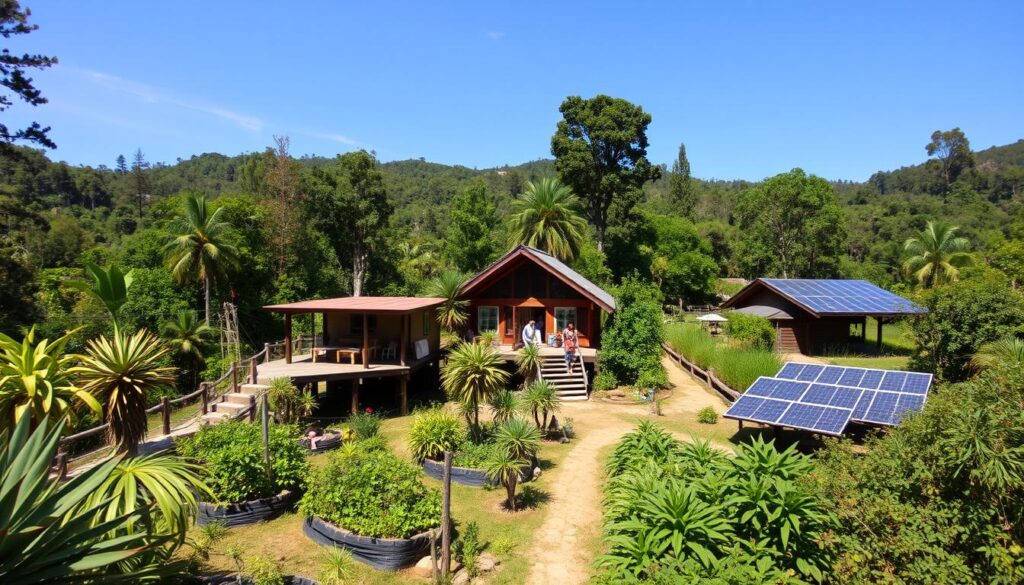
Eco-lodges become important parts of their communities by doing this. They help with the economy, society, and environment. This approach benefits locals and guests alike, making tourism more sustainable and enriching.
| Aspect of Community Involvement | Benefits |
|---|---|
| Collaboration with Local Workers | Economic benefits, job creation, community resilience |
| Promoting Local Culture and Heritage | Cultural preservation, authentic guest experiences, community pride |
| Engaging Guests in Community Activities | Cross-cultural understanding, community development, enhanced guest experience |
Designing Spaces for Nature and Comfort
Creating an eco-friendly hotel or sustainable accommodation starts with the design. Using permaculture principles, we can make spaces that are cozy for guests and good for nature. This means designing areas outside for guests to enjoy nature, like gardens and trails.
A green living retreat should be both green and welcoming. It can use natural materials, save energy, and let in lots of natural light. Eco-friendly features include green roofs, solar panels, and systems to collect rainwater.
With these design choices, an eco-friendly hotel or sustainable accommodation can be kind to the planet. It also offers a special and cozy stay for guests. Key eco-friendly design points include:
- Using natural materials and cutting down on waste
- Choosing energy-saving systems and renewable energy
- Using water wisely with efficient systems and rainwater collection
- Creating outdoor spaces for guests to enjoy nature
Integrating Natural Habitats
It’s important to add natural habitats to an eco-friendly hotel or sustainable accommodation. This makes the space unique and welcoming. We can do this by adding plants, trees, and wildlife to the design.
Permaculture Practices in Food Sourcing
At the heart of ecological lodging is a deep commitment to sustainable practices, including food sourcing. Permaculture, focusing on regenerative tourism, offers a holistic way to manage resources. An organic farm stay is a great example of how permaculture is used in food production. It reduces the lodge’s environmental impact and supports local economies.
Permaculture gardening techniques are key to this approach. They emphasize using local and seasonal produce. This ensures the food served is fresh and nutritious, promoting biodiversity and efficient water use. By adopting these practices, eco-lodges can greatly reduce their need for external food sources. This supports a more regenerative tourism model.
Seasonal and local menu planning is also vital in permaculture practices. By planning menus around what’s locally available and in season, eco-lodges can lessen their environmental impact. This supports local farmers and creates unique dining experiences. It enhances the overall guest experience at the ecological lodging.
Many organic farm stay initiatives worldwide show the success of permaculture in food sourcing. These initiatives show how permaculture can create sustainable food systems. They benefit both the environment and local communities, embodying the principles of regenerative tourism.
Waste Management in Permaculture Eco-Lodging
Effective waste management is key in permaculture eco-lodging. It helps lessen the harm these places do to the environment. By recycling and composting, eco-lodges can cut down landfill waste a lot.
Permaculture practices like composting can make good compost in just a few months. This compost can then enrich the soil in gardens at these lodges.
In earth-friendly places, cutting down waste through design is vital. Using reusable bags for deliveries is a good start. It might take a bit longer, but it cuts down plastic waste a lot.
Vermicomposting is another great way to handle organic waste. It can process a lot of kitchen scraps, making it a top choice for waste management in eco-lodges.
Some eco-lodges teach their guests how to reduce waste. This can really lower the amount of waste made. By doing this, eco-lodges not only lessen their impact on the environment. They also encourage guests to live more sustainably, making the stay more eco-friendly.
Water Conservation Techniques in Eco-Lodging
Water conservation is key for eco-friendly hotels and green living retreats to lessen their environmental footprint. Rainwater harvesting is a great method, capturing 50-90% of a site’s rainfall. It’s vital for regenerative tourism as it cuts down on municipal water use.
Greywater recycling is also crucial. It helps hotels use less water and reduce their environmental impact. For more on water saving, check out permaculture practice for the latest tips.
Some important water-saving methods include:
- Rainwater harvesting systems
- Greywater recycling processes
- Drought-resistant landscaping
These techniques can greatly cut down water use and support eco-friendly practices. By using them, eco-friendly hotels and green living retreats help make regenerative tourism more sustainable.
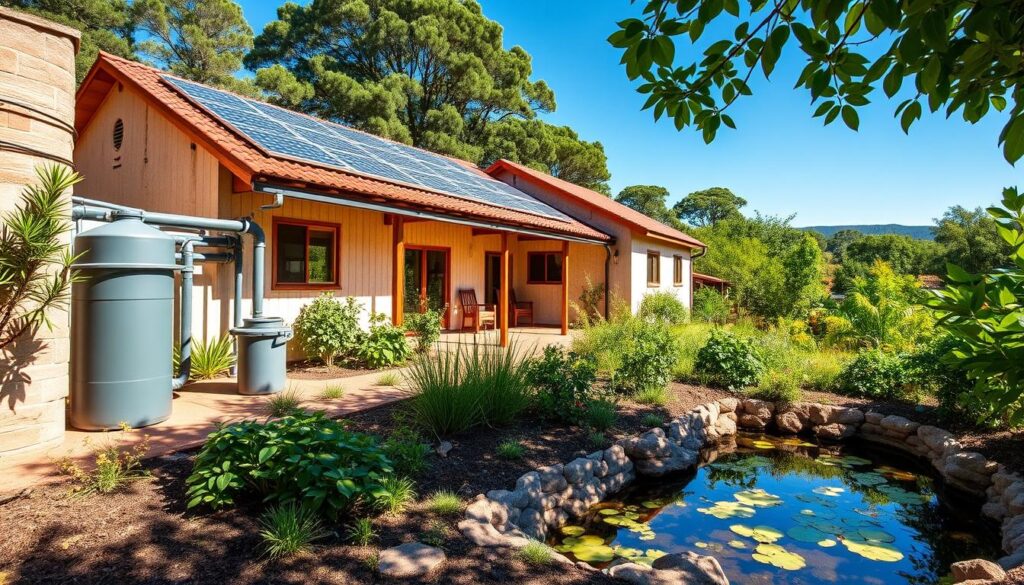
Energy Solutions for Permaculture Lodges
Permaculture lodges focus on sustainable accommodation to lessen their environmental impact. They use energy solutions that are both efficient and green. Lodges are turning to solar and wind power to cut down on non-renewable energy use.
Earth-friendly accommodation also means living off the grid. This lets lodges not depend on the main power grid. It cuts down on carbon emissions and makes them energy self-sufficient. Energy audits help find ways to use less energy and waste less.
For example, Filha Da Lua Eco Lodge is 100% ecological. It has a waste station and an organic farm that absorbs about 11 tons of CO2 yearly. It buys food from local producers and focuses on “farm to table” to be more sustainable.
Permaculture lodges can greatly lessen their environmental harm by using these energy solutions. They offer a unique and ecological lodging experience. As more people look for earth-friendly accommodation, lodges must focus on being energy efficient and sustainable.
| Lodge | Energy Solution | Environmental Impact |
|---|---|---|
| Filha Da Lua Eco Lodge | Renewable energy sources, off-grid living | 11 tons of CO2 sequestered per year |
| LINDENBERG | Permaculture garden project, GreenSign certification | Reduced waste, improved energy efficiency |
Educating Guests on Permaculture Practices
Permaculture eco lodging is a great way for guests to learn about sustainable living. They can get hands-on experience with organic farm stays. This helps them understand permaculture principles better.
Here are some ways to teach guests about permaculture:
- Workshops: Hands-on learning experiences that teach guests about permaculture design, organic gardening, and sustainable living.
- Guided tours: Tours of permaculture gardens and farms that showcase the application of permaculture principles in real-world settings.
- Resources for further education: Providing guests with access to books, articles, and online courses that can help them learn more about permaculture and regenerative tourism.
By teaching guests about permaculture, eco lodging promotes sustainability. It also makes their stay more meaningful. This can inspire guests to live more sustainably in their own lives.
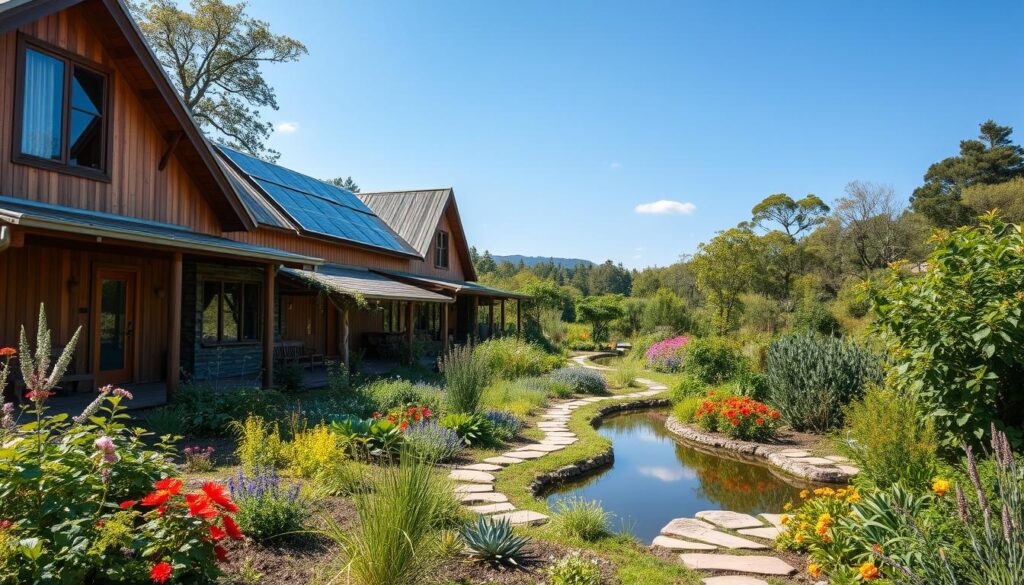
Places like the Permaculture Education Institute and the Rancho Mastatal Sustainability Education Centre are great examples. They offer courses and workshops on permaculture and regenerative agriculture.
| Organization | Program | Description |
|---|---|---|
| Permaculture Education Institute | Permaculture Design Certificate | A comprehensive course that teaches permaculture design principles and practices. |
| Rancho Mastatal Sustainability Education Centre | Permaculture and Regenerative Agriculture | A hands-on training program that teaches permaculture and regenerative agriculture practices. |
The Future of Eco-Lodging in Permaculture Tourism
The future of eco-lodging looks bright, with more people wanting sustainable places to stay. Travelers are now looking for eco-friendly hotels. Eco-lodges are using permaculture to make tourism better for the planet.
Renewable energy, less waste, and supporting local cultures are big in eco-tourism. Eco-lodges are using green housekeeping and farm-to-table dining. They also use eco-friendly materials and tech, like solar water heating.
Trends in Eco-Tourism
- Increased demand for sustainable accommodation and green living retreats
- Growing trend towards permaculture-based eco-lodges
- Adoption of innovative practices such as green housekeeping and farm-to-table dining
As tourism grows, we’ll see more eco-lodges and green places to stay. Climate change will also shape tourism, with eco-lodges working to be more sustainable.
Challenges Facing Permaculture Eco-Lodging
Permaculture eco-lodging is a type of ecological lodging that focuses on earth-friendly accommodation. It faces many challenges. These include financial issues, regulatory problems, and balancing quality guest experiences with eco-friendly practices.
The cost of setting up and keeping permaculture eco lodging is high. It’s crucial to find ways to cut costs without lowering the quality of the stay.
Some of the main challenges are:
- Financial sustainability: The high initial investment in sustainable infrastructure and practices.
- Regulatory hurdles: Navigating local regulations that may not fully support or understand permaculture practices.
- Guest experience: Balancing the need for comfort and amenities with the commitment to eco-friendly practices.
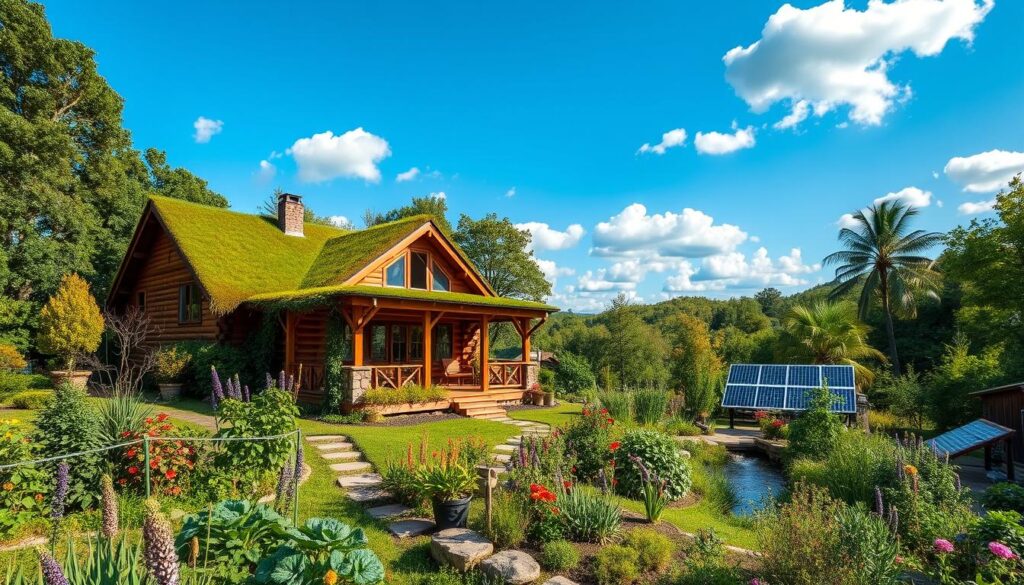
Despite these hurdles, many permaculture eco-lodges are finding creative solutions. They use community engagement, educational programs, and strategic partnerships. By doing so, they can not only survive but also flourish. This offers guests a unique and enriching experience while helping create a more sustainable future.
Case Studies of Successful Permaculture Eco-Lodges
The need for organic farm stays and regenerative tourism is growing. Many sustainable places have become examples of permaculture eco-lodges. In the United States, the Green Beat Farm is a great example. It sells vegetables and microgreens to nearby restaurants.
Worldwide, places like the IDEP Foundation in Indonesia and the Senegal Permaculture Project are making a big difference. They teach local communities how to live sustainably.
These examples show how permaculture works in different places. They teach us about the value of community, making money in different ways, and caring for the environment. As more people look for eco-friendly travel, permaculture tourism is becoming more popular. It offers a chance to help protect local nature and culture.

